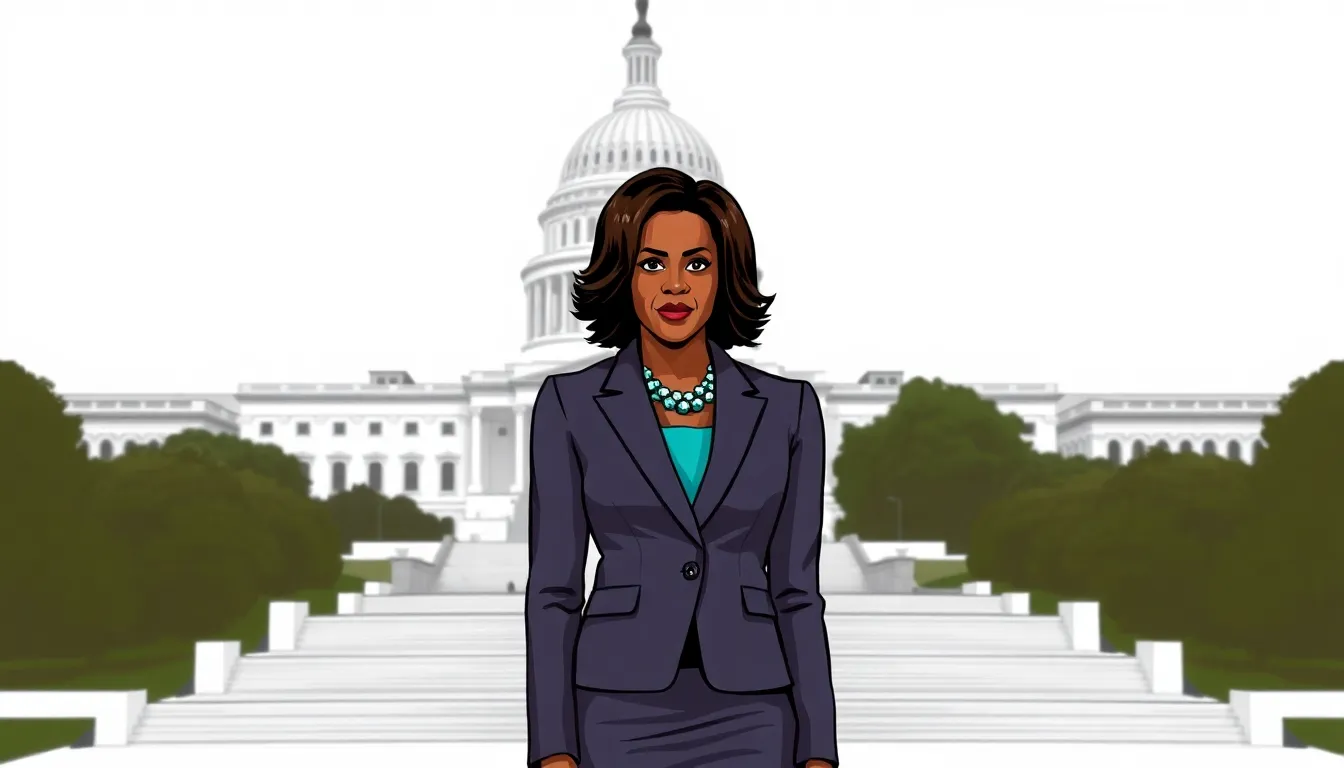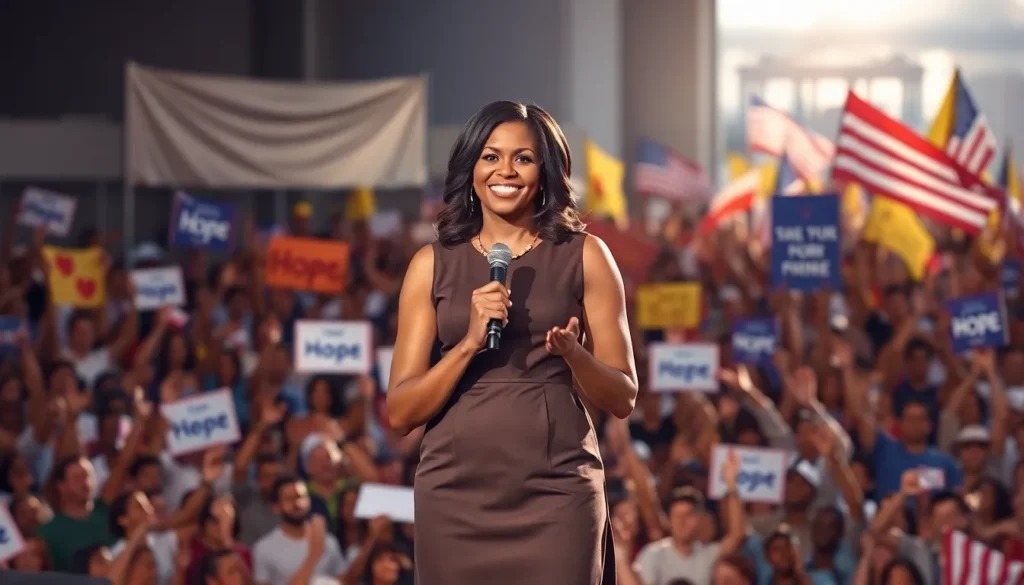Table of Contents
ToggleAs the world eagerly watches the political landscape shift, one name keeps popping up in conversations: Michelle Obama. With her charisma, intelligence, and a knack for connecting with people, she’s got the kind of appeal that could make even the most skeptical voter sit up and take notice. But can she really run for president?
Overview of Michelle Obama’s Political Influence
Michelle Obama holds a significant position in American political discourse. Her role as First Lady from 2009 to 2017 established her as a prominent advocate for various social issues. Focused on education, health, and military families, she initiated programs like Let’s Move! and Reach Higher. Each program aimed to inspire youth and promote healthier lifestyles.
Public speeches amplify her influence. Many regard her as a powerful orator capable of captivating diverse audiences. Engagements at events, like the Democratic National Convention, showcased her ability to resonate deeply with listeners. Through these platforms, she tackled critical issues such as inequality and voter engagement.
Michelle Obama’s memoir, Becoming, further extended her political reach. The book sold over 14 million copies and sparked discussions about race, identity, and female empowerment. Readers identified with her journey, connecting personal experiences to broader societal challenges.
Social media platforms also serve as a medium for her influence. With millions of followers, Michelle leverages these channels to advocate for causes, promoting civic engagement and social justice. Her outreach often encourages young people to participate in democracy.
Public perception remains overwhelmingly positive. Polls indicate high favorability ratings, reflecting her ability to cultivate trust and relatability. Many consider her a potential candidate who could unify diverse groups, there remains speculation about her willingness to enter the political arena.
Legal Eligibility for Presidential Candidacy

Michelle Obama meets the fundamental legal criteria for presidential candidacy as outlined in the U.S. Constitution.
Age and Citizenship Requirements
The Constitution mandates that a presidential candidate must be at least 35 years old. Given her birth date of January 17, 1964, Michelle Obama currently surpasses this threshold. U.S. citizenship is another prerequisite, and she qualifies as a natural-born citizen, having been born in Chicago, Illinois. Meeting these basic age and citizenship criteria positions her as eligible for the presidency.
Residency Requirements
A presidential candidate must reside in the United States for at least 14 years. Michelle Obama lived in Washington, D.C., during her time as First Lady and spent her formative years in Illinois. This extensive residency fulfills the requirement, making her eligible based on her background. Given her long-standing ties to American society and culture, she easily meets this criterion for candidacy.
Public Support and Popularity
Michelle Obama’s public support remains strong, with many viewing her as a potential presidential candidate due to her widely admired persona. Her commitment to social issues resonates across demographics.
Polling Data and Approval Ratings
Recent polling data shows Michelle Obama consistently ranks favorably among potential presidential candidates. Various surveys indicate her approval ratings hover around 70%, reflecting strong bipartisan support. Many voters appreciate her authenticity and relatable approach, contributing to her popularity. Notably, individuals recognize her leadership during significant national crises, enhancing her standing among the electorate.
Influence of Public Opinion
Public opinion plays a crucial role in shaping perceptions about Michelle Obama’s political aspirations. Many feel her ability to connect with various audiences translates into strong support for a presidential campaign. Engaging discussions about her potential candidacy emerge, especially among younger voters eager for fresh perspectives. Her advocacy for social justice and civic engagement greatly influences how the public perceives her readiness to take on a national role.
Potential Political Agenda and Policies
Michelle Obama’s potential political agenda might reflect her commitment to health, education, and civic engagement. She emphasizes practical solutions addressing social issues through her initiatives.
Health and Nutrition Initiatives
Advocating for health and nutrition remains a priority for Michelle Obama. Her “Let’s Move!” initiative transformed the conversation around childhood obesity, promoting physical activity and healthier eating habits in schools. Programs aimed at increasing access to nutritious food directly impact underserved communities. Ongoing efforts to partner with organizations ensure a broader reach and sustained support. Highlighting the importance of mental and physical health in her platform could resonate well with voters seeking change. Recent statistics reveal childhood obesity rates declining in areas implementing her programs, reflecting successful outcomes.
Education and Youth Programs
Education initiatives serve as another cornerstone of Michelle Obama’s agenda. Her “Reach Higher” campaign inspires young people to pursue their education beyond high school, focusing on college readiness and access. Integrating mentorship programs connects students with professionals, fostering career development. Emphasizing the importance of equity in education aligns with current discussions about systemic barriers. Educational attainment plays a crucial role in economic mobility, supporting her commitment to improving opportunities for all. Her track record highlights a dedication to elevating youth voices, making her a strong advocate for educational reform.
Challenges and Obstacles
Michelle Obama faces various challenges and obstacles in considering a presidential run.
Media Scrutiny and Criticism
Media scrutiny significantly impacts public figures, and Michelle Obama isn’t exempt. Reporters and critics often highlight her past, analyzing her every statement and action. Negative coverage can shape perceptions, especially given her visibility during her husband’s presidency. Critics may focus on her initiatives, questioning their effectiveness or potential controversies. Furthermore, social media amplifies both support and dissent, with opinions circulating rapidly. Despite her positive public image, media narratives can shift, creating potential hurdles for any campaign. Navigating this complex landscape requires careful management of her public persona and clear communication of her positions.
Party Support and Internal Politics
Support from the Democratic Party plays a crucial role in any candidacy. Party leaders and influential figures may influence her decision to run. Internal dynamics within the party could also complicate her path; factions may contest her vision and priorities. Building coalitions becomes essential for gaining the backing necessary to mount a successful campaign. Additionally, navigating competing interests and uniting various party groups can prove challenging. Her ability to connect with diverse demographics inside the party may significantly affect her chances. Strong relationships with party members can bolster her viability as a candidate, reinforcing the importance of strategic alliances.
Michelle Obama’s potential candidacy for president continues to spark lively discussions across the nation. Her impressive track record as First Lady and her ability to inspire through advocacy make her a compelling figure in American politics. With high favorability ratings and a strong connection to diverse audiences, she embodies the qualities many voters seek in a leader.
While challenges exist, including navigating media scrutiny and party dynamics, her commitment to social justice and civic engagement resonates deeply with the electorate. As the political landscape evolves, the question of whether Michelle Obama will step into the race remains open, but her influence is undeniable.





